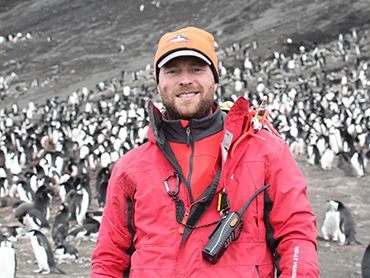To the Zooniverse and beyond
Harnessing the time and skills of millions of volunteers worldwide is proving to be an extremely powerful way of driving research in fields as diverse as history, zoology, physics and even the response to humanitarian disasters.
 Tom Hart of Penguinwatch.
Tom Hart of Penguinwatch.The immense success of Galaxy Zoo quickly led to requests from other researchers for a platform that would allow them to harness this ‘people power’. In response, the Oxford team built Zooniverse – an online platform for producing projects tailored to almost any field of study. Early projects included Planet Hunters, which made remarkable discoveries including the identification of the first planet in a four-star system.
In just a few years Zooniverse has become the world’s largest and most popular platform for people-powered research, hosting over 50 projects which allow more than a million people worldwide to engage in a vast range of academic research: studying ancient papyri, identifying plankton or wildlife in Mozambique, helping understand how genes affect behaviour, or annotating diaries from the First World War.
And the effects are not just felt within academic departments. Two projects in particular have had direct environmental impact. Orchid Observers provides a forum for people to identify orchids, note their flowering stages, and upload their own images. The data generated shows beyond doubt that UK orchids are flowering earlier than they used to – a clear measure of the effect of climate change. In Penguinwatch, participants mark penguins, eggs and chicks in their nesting sites, giving researchers detailed data about breeding success. This is revealing the effect of commercial fishing on penguin colonies, and is likely to lead to changes in fishing policy.
A new project, the Planetary Response Network, is trialling something never attempted before: a platform that invites the public to assist in disaster response. Immediately after the Nepal earthquake in April 2015, researchers at Oxford showed – for the first time in this kind of situation – that an online ‘crowd’ could help to quickly generate reliable data to inform search and rescue operations on the ground. The potential of this ‘planetary response network’ is enormous.
Finally, Zooniverse now provides any researcher anywhere in the world with the tools to build their own project, without the need for specialist technological input. In terms of the future of ‘people-powered research’, it seems that the sky – or perhaps the universe – is the limit.
Research funded by: a Google Global Impact Award, Helmsley Foundation, AHRC, EPSRC, STFC